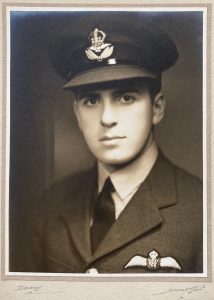William Henry Nelson, decorated bomber pilot and the only Canadian Spitfire Ace in the Battle of Britain, was shot down 85 years ago today. His airplane crashed in the sea in the English Channel, and neither he nor it were ever found. He was, as has been written, a man of many talents. Few men flew as both bomber and fighter pilot in the Second World War, even fewer excelled at both.
In 1936, at the age of nineteen, he left his native Montreal and went to England to join the Royal Air Force. There was no war on, and he didn’t go to fight. He just wanted to be a pilot. By the time the war began over three years later, he had become a bomber pilot and a husband. He was among the first Canadians to fly in combat.
In June 1940 Nelson was awarded a Distinguished Flying Cross. As France fell to Nazi Germany and Hitler prepared to invade England, he made an extraordinary decision. In the dire need of the moment, Nelson chose to respond to Fighter Command’s desperate call for volunteers. He would retrain as a fighter pilot and return to action as soon as possible, necessarily leaving behind his wife Marjorie, by then seven months pregnant. If he hadn’t principles to fight for in 1936, he had them now. They both saw Nazism as a dire threat to humanity and civilization, and Marjorie was as committed as he was to fight it. By August Nelson was flying in the Battle of Britain, by 29 October he had destroyed five enemy aircraft in combat, so achieving the status of fighter ace. Three days later he was killed, leaving his wife and two-month old son.

Flt Lt William Henry Nelson, DFC
2 April 1917 – 1 November 1940
Photo credit Bill McAlister
Willie Nelson was recognized as a hero in his time for what he did. If his actions and achievements have faded from memory, along with much else about the Second World War, we should nonetheless remember him as a hero in our time for why he did what he did.
Some might ask what is the point of looking back on a time that now seems like ancient history? My answer is that we need to remind ourselves of what so many Canadians sacrificed and suffered during that terrible war, and why. We should do so not to glorify war or warriors, but to remind ourselves of the courage and sacrifice of so many of Nelson’s generation. We should keep their memory fresh because if we allow it to fade we facilitate the re-emergence of the very things they chose to resist.
How many of us would make the kind of choice that Willie Nelson did in the dire circumstances of his time? How many of us would put aside our comforts and our prospects for however long it might take to overcome an existential threat?
After all this time we are faced with similar existential threats. If they are new in form, the fundamental challenge they pose to our core values and well-being is not much different. Will we recognize the dangers confronting us in time? Will we develop the new strategies to resist that will be fit for our time and place? Will we have the conviction to act and the fortitude to sacrifice? Can we rise above differences to act together effectively? William Henry Nelson provided an example to remember.